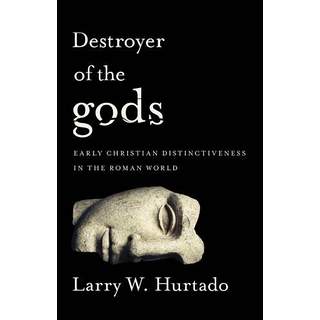BEN: In your first full chapter, you talk about the Jewish and pagan reactions to earliest Christianity. One theme which keeps surfacing is that there were strong negative reactions at the ideological level, not just in terms of praxis. This in turn suggests there must have been something distinctive, and apparently repugnant to many, about the early Christian belief system. You also point out some of the differences between the reaction to early Judaism (which did sometimes involve satire and anti-Semitism) and the even stronger reaction to early Christianity in some quarters. What do you attribute this to? Is it because Christianity was much more of an evangelistic religion than early Judaism, and so was seen as more of a threat to the socio-religious ethos of the Empire? Is this also why the rejection and abuse happened off and on throughout the first three centuries (which you say is unprecedented when compared to other religious groups even other ‘superstitions’), until Constantine changed the situation? Was it also the multi-ethnic character of early Christianity compared for the most part with Judaism?
LARRY: Basically, yes, I think that early Christianity generated disproportionately more abuse because Christians were more aggressive in spreading their faith, and also because Christian faith was aggressively trans-ethnic. Many/most religious groups in the Roman world had ethnic origins and ties, Judaism being only one example. But from earliest years, it seems, the young “Christian” movement spread from Jewish origins to include gentiles, and in Paul’s mission this was done programmatically. And the key factor, I think, in generating the resultant hostility was the demand that adherents forsake “idolatry,” i.e., worshipping the many deities of the time. Jews could do so, and it was seen as simply their ethnic peculiarity. But in the eyes of their fellow pagans, pagan Christians had no basis for their anti-religious stance. It was outrageous, socially divisive, “atheistic”, and so incurred a good deal of wrath.
BEN: On p. 32 you stress that the reactions from some of the cultural elites, including written rebuttals, in the Greco-Roman world suggests that Christianity was recruiting some of the cultural elites and so was seen as a threat to the ideology and very structure of the dominant culture. In other words, it was not just ordinary women, slaves, and minors and the poorest members of society that were becoming Christians.
LARRY: As various scholars over the preceding decades have observed (Edwin Judge, Wayne Meeks, etc.), Pauline churches of the 50s were composed of people of a diversity of social and economic levels (though seldom then, it appears, from the very top ranks). By the second century, there were also individuals with some advanced education in philosophy as well, who sought to defend Christianity (e.g., Justin Martyr), and I cite evidence and studies showing Christians among the upper social ranks of the time too. I think that the conversion of such individuals was likely what triggered the learned attacks on Christianity by Celsus and others.
You can find Larry’s book at——Baylor UP website: http://baylorpr.es/sHurtado













